

How to start teaching kids English at home. By Jo Blackmore, LearnEnglish Kids team How do I start teaching my kids English at home? Many parents would like to teach their children English at home, but don’t know how to start. It doesn’t matter if your own English is not perfect. The most important thing is that you are enthusiastic and that you give your children lots of encouragement and praise. Your child will pick up on your enthusiasm for the language. Play to Learn. Taking Playtime Seriously.
So part of encouraging play is pulling back on how much programmed goal-directed learning we expect from very young children, to leave them time for the fun of exploration, curiosity and, well, fun. But another important part may be creating environments that foster children’s play and parents’ participation and attention. Dr. Hirsh-Pasek, who is a senior fellow at the Brookings Institution, cited its Learning Landscapes Initiative, which aims to set up learning opportunities in public places where people will encounter them. One of these, the Urban Thinkscape project in Philadelphia, involves puzzle benches at bus stops, with puzzles designed to build STEM skills.
Before the benches were installed, she said, parents waiting for buses were almost uniformly looking at their cellphones. “We put one up in a park,” she said. Dr_david_whitebread_-_the_importance_of_play.pdf. Importance of play for babies & children. Australian Government Department of Education and Training (2009). Belonging, being and becoming: The early years learning framework for Australia. Canberra: Commonwealth of Australia.
Retrieved 19 June 2019 from Cole-Hamilton, I. (2011). Getting it right for play: The power of play: An evidence base. Fleer, M. (2013). Ginsburg, K.A. (2007). Lester, S., & Russell, W. (2010). Lui, C., Solis, S.L., Jensen, H., Hopkins, E.J., Neale, D., Zosh, J.M., Hirsh-Pasek, K., & Whitebread, D. (2017). How young children learn English through play. As we release Learning Time with Timmy – our first app for early-years learners of English – Danitza Villarroel, a teacher on our Learning Time with Shaun and Timmy course in Chile, explains the importance of learning through play, and offers a few tips for teachers new to this age group.
Teaching English to pre-school children can be daunting for teachers new to this age group. Young children have shorter attention spans than older children and adults, and they're still learning their mother tongue. But teaching these learners can be enormously rewarding once you've taken a few basic principles on board. The importance of active learning. Play. Moodle. 6 Types of Play: How Children's Play Becomes More Social. Play is a serious business. The pioneering developmental psychologist Lev Vygotsky thought that, in the preschool years, play is the leading source of development.
Through play children learn and practice many basic social skills. Getting the right balance between adult-led and child-initiated learning. As an early years practitioner you will know the importance of creating the right balance between adult-led and child-initiated learning. Help all children learn and develop with this guide. Adult-led activities are based on our own professional understanding of what we should teach young children and what experiences they should have. Through adult-led activities we can introduce children to new ideas, provide opportunities for them to develop their skills and ensure that they experience all areas of learning in the Early Years Foundation Stage (EYFS). Heuristic play. Heuristic play is rooted in young children’s natural curiosity.
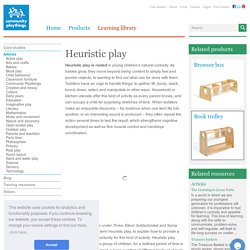
As babies grow, they move beyond being content to simply feel and ponder objects, to wanting to find out what can be done with them. Toddlers have an urge to handle things: to gather, fill, dump, stack, knock down, select and manipulate in other ways. Household or kitchen utensils offer this kind of activity as every parent knows, and can occupy a child for surprising stretches of time. When toddlers make an enjoyable discovery – for instance when one item fits into another, or an interesting sound is produced – they often repeat the action several times to test the result, which strengthens cognitive development as well as fine muscle control and hand/eye coordination. In their book, People under Three, Elinor Goldschmied and Sonia Jackson coined the term heuristic play, to explain how to provide a more structured opportunity for this kind of activity. Heuristic play with objects is not a novel idea. Public Media for Northern CA.
There was a direct correlation between the children who’d heard a lot of parent talk and how prepared they were to learn once they arrived at school.
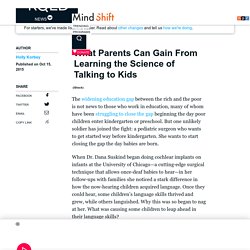
Hart and Risley wrote, “With few exceptions, the more parents talked to their children, the faster the children’s vocabularies [grew] and the higher the children’s IQ test scores at age 3 and later.” For Suskind, a lightbulb went on. “The truth is, much of what you see in children born into poverty is analogous to children born deaf,” Suskind said. “It’s a really important point. The most fundamental science shows that it’s really language, and all that comes with it, the brain-building aspect of things, that makes a difference.” Bringing Parents On Board In Suskind’s new book, "Thirty Million Words," she explains the research behind the word gap in detail, along with her research-based initiative of the same name, aimed at boosting children’s brains in the first three years of their lives. . * Tune In. . * Talk More. Patricia Kuhl: The linguistic genius of babies. How can young children best learn languages?
The British Council's Tracey Chapelton explains how parents of young children can lay the foundations for success. Children's brains are highly active Your child is unique, but what all children have in common is natural curiosity and an innate ability to learn. Does being bilingual make you smarter? Language teacher and researcher Miguel Angel Muñoz explains the latest research on how being bilingual affects your brain, ahead of a British Council seminar in Cardiff on whether learning a foreign language makes you smarter. You can watch the live-streamed seminar on Tuesday, 3 June.
More than half the world's population uses two or more languages every day It is hard to estimate the exact number of bilingual people in the world, as there is a lack of reliable statistics . How young children learn English as another language. By Opal Dunn, educational consultant and author Introduction Young children are natural language acquirers; they are self-motivated to pick up language without conscious learning, unlike adolescents and adults.
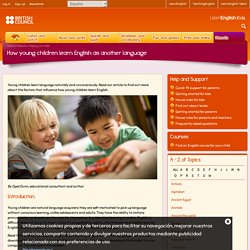
They have the ability to imitate pronunciation and work out the rules for themselves. Any idea that learning to talk in English is difficult does not occur to them unless it’s suggested by adults, who themselves probably learned English academically at a later age through grammar-based text books. Read the notes below about young children learning English as another language. A few more myths about speakers of multiple languages. Does multilingualism cause language delays and identity problems? The British Council's Nayr Ibrahim busts a few more myths about speakers of multiple languages. Myth: Multilingualism causes language delay Raising children bilingually is sometimes believed to cause language delay. This misconception is based on a separate underlying proficiency (SUP) hypothesis.
This theory, now discredited, suggests that languages are stored in separate compartments or containers, which represent half the capacity of the monolingual brain. Tips on Learning to Talk. Learning to talk is a process that starts at birth, when your baby experiences how voices can sound.
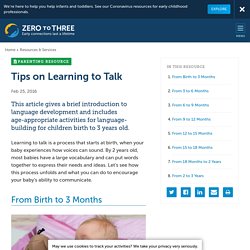
By 2 years old, most babies have a large vocabulary and can put words together to express their needs and ideas. Let’s see how this process unfolds and what you can do to encourage your baby’s ability to communicate. From Birth to 3 Months. Does my toddler have a short attention span because she won’t sit still for a...
A: It is perfectly normal for toddlers to not sit still very long—period.
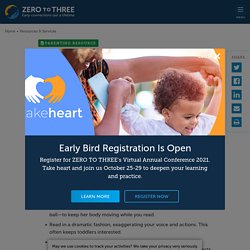
Most don’t like to stay in one place for long now that they can explore in so many new ways—by running, jumping, and climbing. So, an adult’s idea of snuggling on the couch to hear a story may not be the same idea a toddler has for story-time. You may only be able to read or talk about a few pages in a book at a time. Classroom management for young learners. Definition of Classroom Management Classroom management refers to the ways in which student behaviour, movement and interaction during a lesson are organized and controlled by the teacher” Richards (1990, 10) .
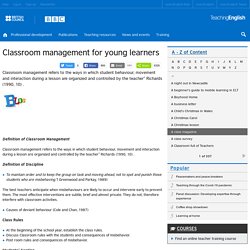
Definition of Discipline. Surprisingly Simple Techniques for Challenging Behaviour - Kathy Brodie Early... Alison Gopnik: What do babies think? The Power of Evening Routines. The word “structure” can evoke less than positive associations. How baby brains develop. Early childhood development – it’s not rocket science, it’s neuroscience! - K... You speak with an accent. I don’t.
FAQ: Raising Bilingual Children. Deb Roy: The birth of a word. Listen to Your Mother. Young children face a remarkable challenge in learning to use the language of their culture. Let's Talk. Why does my toddler love repetition? Paediatric speech and language therapist It may test your patience when your toddler demands 'Row, row, row your boat' for the 10th time.
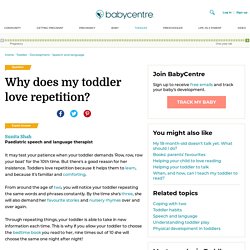
How can I help my child to start talking? (Video) Multilingual Preschoolers.